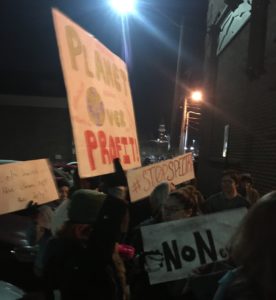By JAN LARSON McLAUGHLIN
BG Independent News
As protesters packed the city building and chanted outside, Bowling Green City Council voted unanimously Monday evening to deny an easement for a pipeline across city property.
The decision was full of drama – with one man being escorted from the meeting by police, and the city building packed to capacity, so about 40 people had to listen to speakers relaying the meeting outside.
Council President Mike Aspacher started the meeting by asking to depart from the regular agenda. “The building is overflowing,” causing concerns to the fire chief, he said.
So, Aspacher suggested that council go straight to the pipeline ordinance and vote prior to hearing any testimony. That caused a brief uproar in council chambers, with people demanding to be heard.
Aspacher said council had listened to many comments at the last two meetings, and wished to act on the ordinance. But Joe DeMare, who recently ran for U.S. Senate with the Green Party, continued his objection.

Joe DeMare is escorted out of council chambers by police.
“I’m respectfully requesting that you listen to the people,” DeMare said.
“Please take your seat,” Aspacher again asked.
When DeMare refused, Aspacher asked police to escort him out of council chambers.
Then council member Sandy Rowland told the packed room that they would not be displeased with council’s action. And one by one, the council members stated why they planned to vote down the easement.
The delay in the speaker system outside the city building meant the cheers from the parking lot rose up to council chambers about 20 seconds later than the action was taken.
After three council members explained their “no” votes, the chants of “one more vote” started outside. Council member John Zanfardino went over to the window and opened it wider to hear the chants and announce that he would be the fourth vote to reject the pipeline easement.
“I just don’t want to be complicit voting for pipelines,” Zanfardino said.
Then a new chant rose up from outside. “This is what democracy looks like.”

Protesters stand outside the overflowing city building.
Council’s vote at least temporarily denies Nexus natural gas pipeline the right to cross 29 acres of city land located in Middleton Township, about 2.5 miles east of the city’s water treatment plant.
The Bowling Green vote came one day after federal officials announced the much protested Dakota Access Pipeline would be rerouted. That fact was not lost on Anita Britt, who thanked council for looking at the bigger issue.
“Thank you for listening to the voices of your community,” she said. She praised council for “doing your part to change history.”
Another pipeline protester, Andrew Smith from Elyria, thanked council for showing courage that some communities have lacked. But he added, “You are not the only people fighting this.” Smith also warned that council’s action may lead to lawsuits. “This battle does not stop here,” he said.
City Council also heard from Undergraduate Student Government at BGSU, which passed a resolution asking the city to deny the easement. Aspacher said he was “impressed” by the well thought out arguments from the students.
“I am heartened by situations such as this,” that stir such passionate public participation, Aspacher said. The public input, through emails, phone calls and at council meetings, was very “convincing” about the potential dangers to public health and the environment caused by the pipeline.
Rowland said her “no” vote was based on her overwhelming suspicion of information presented by the pipeline officials about tax revenue for the region, employment created by the project and benefits to the city and its residents.
Council member Daniel Gordon expressed his dislike of a business that has to “threaten eminent domain to get their way.”
Gordon acknowledged Bowling Green’s easement denial is unlikely to halt the pipeline project. But he also pointed out that the pipeline company currently does not have eminent domain powers because it has not yet proven the benefits it would bring to Ohio communities.
“I believe the pipeline does not serve the public’s best interest,” he said. But perhaps enough communities will stand up to the pipeline to make a difference, he added.
“I hope we will be on the right side of this issue,” Gordon said.
Council member Bruce Jeffers said he tried to decide what made this pipeline project different than others. He said he was swayed by concerns from a respected local geologist, Dr. Bob Vincent, who has asked for a study of the ground where the pipeline is proposed by the Maumee River.
Council member Scott Seeliger said his vote against the pipeline was based on support of the community and their concerns about the environment. “I’m proud to join my colleagues and vote ‘No.’”
Council member Bob McOmber said that he was leaning toward asking for a delay in the ordinance vote, but said he believed in the value of showing unanimous support on an issue such as this. “I think it’s my turn to compromise now,” he said.
The 36-inch Nexus natural gas pipeline is proposed for 255 miles from fracking fields in eastern Ohio, across the state, to Michigan and ending in Canada. Along its route, it will pass through Wood County, north of Bowling Green, then go under the Maumee River downriver from the city’s water intake. Once it gets to Waterville Township, a compressor station is proposed.
Bowling Green officials had maintained that fighting the pipeline will not change the route and will only end up costing the city in court. The city’s acreage is currently rented out for farming, and has two Toledo Edison electric easements already on it. The Nexus pipeline was planned adjacent to those easements. Nexus had agreed to pay the city $151,000 for the easement.
Jeffers also reminded the audience that if they don’t want natural gas pipelines or coal, then they need to support renewable energy. And Aspacher urged local citizens to show up and offer input at more city council meetings on other topics that affect the community.




